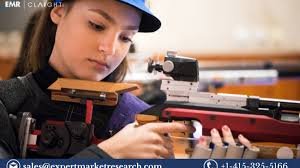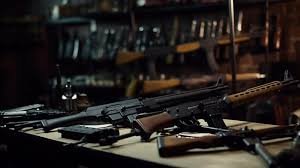The world of firearms trade is vast and complex, commonly referred to as guns international. This article delves into the intricacies of the global firearms market, examining its history, key players, regulatory frameworks, and the challenges it faces in contemporary society.
Table of Contents
Understanding Guns International: A Comprehensive Overview
Guns international encompasses the trade of firearms across national borders, including both legal and illegal transactions. This market is multifaceted, involving a variety of firearms, from military-grade weapons to civilian firearms such as handguns and hunting rifles. As globalization continues to shape economies and cultures, the guns international market has expanded, reflecting a more interconnected world.
Historical Context of Guns International
The historical evolution of guns international trade can be traced back to the early days of firearms. However, the modern arms trade began to take shape significantly during the Cold War era. Geopolitical tensions led to massive military build-ups and subsequent decommissioning of arms, resulting in surplus weapons that found their way into the international market.
After the Cold War, the guns international market saw a surge in proliferation. Countries sought to capitalize on surplus military weapons, and illicit trade routes began to flourish. This environment prompted the establishment of international agreements, such as the Arms Trade Treaty (ATT) in 2013, which aimed to regulate the global arms trade and prevent the diversion of firearms to unauthorized users.
Key Players in the Guns International Market

The guns international market consists of various stakeholders, each playing a crucial role in its dynamics:
- Manufacturers: Leading companies such as Glock, Smith & Wesson, and Heckler & Koch produce firearms for both military and civilian markets. These manufacturers are central to the guns international supply chain, supplying weapons that are sold across borders.
- Governments: Countries like the United States, Russia, and China are among the largest exporters of firearms. Their military alliances and defense strategies heavily influence global arms trade dynamics.
- Private Arms Dealers: Numerous private entities operate within the guns international market, facilitating transactions between manufacturers and governments or civilians. These dealers often navigate complex regulations to conduct business legally.
- International Organizations: Bodies like the United Nations play a significant role in regulating the guns international market. They work to promote disarmament, prevent illicit trafficking, and enhance global security through various treaties and programs.
Legal Framework Governing Guns International
The regulation of guns international trade is crucial for maintaining security and promoting responsible commerce. Various treaties and national laws govern how firearms can be traded. The ATT is a landmark agreement that establishes standards for the international transfer of conventional arms, including firearms.
Countries have different laws concerning the export and import of firearms. For example, in the United States, the Bureau of Alcohol, Tobacco, Firearms and Explosives (ATF) regulates the export of firearms, requiring licenses for international sales. Understanding these legal frameworks is essential for anyone involved in the guns international market.
The Role of Technology in Guns International
Technological advancements have had a profound impact on the guns international market. Innovations in manufacturing, such as 3D printing and advanced materials, have made it easier to produce firearms. While these technologies have the potential to enhance production efficiency, they also raise concerns about unregulated production and distribution.
The digital landscape has facilitated the illegal trade of firearms, with online platforms enabling anonymous purchases. This has made it increasingly difficult for regulators to monitor and control the flow of weapons in the guns international market. As technology continues to evolve, so must the approaches to managing firearms trade and ensuring public safety.
Challenges Facing the Guns International Market
The guns international market faces numerous challenges, including:
- Illegal Trafficking: The illicit arms trade poses significant threats to global security, contributing to violence and instability in many regions. Non-state actors, such as terrorist groups and organized crime syndicates, exploit gaps in regulation to acquire weapons.
- Regulatory Inconsistencies: Varying laws across countries create vulnerabilities in the guns international market. Some nations have lax regulations, making it easier for arms dealers to operate without oversight. This inconsistency can undermine international efforts to promote security.
- Ethical Concerns: The moral implications of arms sales, particularly to countries involved in conflicts or with poor human rights records, raise ethical questions for manufacturers and governments. Balancing economic interests with ethical considerations remains a significant challenge in the guns international arena.
The Impact of Illegal Arms Trade
The impact of illegal arms trade on the guns international market is profound. Illicit firearms contribute to prolonged conflicts, exacerbate violence, and undermine efforts to achieve peace and stability. The proliferation of small arms and light weapons is particularly concerning, as these weapons are frequently used in civil unrest and crime.
Efforts to combat illegal arms trade require collaboration among governments, law enforcement agencies, and international organizations. By sharing intelligence and resources, stakeholders can develop more effective strategies to disrupt trafficking networks and prevent firearms from falling into the wrong hands.
International Organizations and Guns International
International organizations play a vital role in shaping the guns international market. The United Nations, through initiatives like the UN Disarmament Programme, works to promote peace and security by regulating arms trade and addressing the root causes of conflict. The UN also facilitates discussions among member states to develop collaborative strategies for reducing the illicit arms trade.
Regional organizations, such as the African Union and the Organization of American States, implement measures to combat the illegal arms trade within their jurisdictions. These organizations serve as platforms for dialogue and cooperation, enhancing collective security efforts among member states.
Future Trends in Guns International

As we look to the future, several trends are likely to shape the guns international market:
- Geopolitical Shifts: Changes in global power dynamics may influence the demand for firearms. Emerging powers may seek to enhance their military capabilities, impacting international arms trade.
- Technological Innovations: The integration of artificial intelligence and smart technology into firearms will change how weapons are designed, manufactured, and regulated. Policymakers will need to adapt to these advancements to ensure responsible use.
- Public Safety Concerns: Increasing awareness of gun violence and mass shootings in various countries is prompting discussions about stricter regulations. This could lead to heightened scrutiny of manufacturers and governments regarding their practices in the guns international market.
- Sustainability Initiatives: As global awareness of environmental issues grows, there may be a push towards more sustainable practices within the firearms industry. This could involve exploring eco-friendly materials and manufacturing processes.
Conclusion: Navigating the Complexity of Guns International
The guns international market is a complex and multifaceted landscape that requires careful navigation. Understanding its dynamics is essential for policymakers, manufacturers, and consumers alike. As the world continues to grapple with the challenges associated with firearms trade, promoting responsible practices, enhancing regulatory frameworks, and fostering international cooperation will be crucial.
In summary, the guns international market presents both opportunities and challenges. By addressing the issues inherent in this industry, we can work towards a future where firearms are used responsibly and do not contribute to violence or conflict. Continued dialogue and collaboration among all stakeholders are vital for ensuring a safer and more secure world.
The Importance of Dialogue and Collaboration in Guns International
Open communication and collaboration among nations, manufacturers, and international organizations are essential for the effective regulation of the guns international market. By sharing best practices and intelligence, stakeholders can better address the complexities of global arms trade and work towards a safer future.
The Role of Education and Awareness in Guns International
Educating the public and policymakers about the implications of guns international trade is critical. Awareness campaigns can foster informed discussions about firearms regulations, ethical considerations, and the impact of illegal trafficking. By promoting education and awareness, stakeholders can work together to create a more responsible and informed approach to firearms trade.
Also read Dallas Mavericks vs OKC Thunder Match Player Stats: Key Insights and Analysis
Conclusion: Moving Forward in Guns International
As we navigate the intricacies of the guns international market, it is essential to remain vigilant and proactive. By embracing collaboration, innovation, and education, we can address the challenges posed by the firearms trade and work towards a safer, more secure global community. The journey ahead requires commitment and determination from all stakeholders involved in the guns international landscape.


